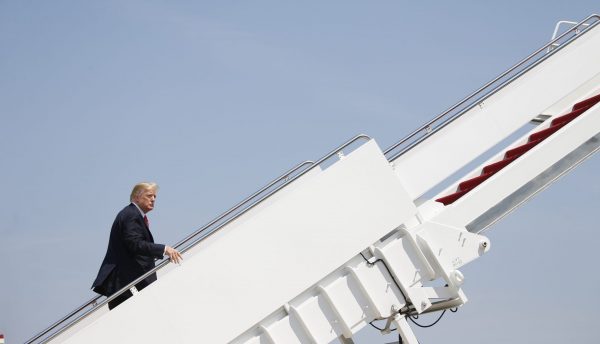There are those who argue that President Trump’s unpredictability may be needed to shake up stalemates like there are on North Korea policy. Barack Obama’s much-vaunted ultra-rationality did not produce, it could be argued, a significant diminution of the threat from Kim Jong-un. Have Trump’s tweets and belligerence changed the calculus in Pyongyang and Beijing? The jury may still be out, but what is clear is that the unpredictability that they introduce — planned or totally unintended — raises the risk of foreign policy mistakes and miscalculation. The cost of military action against Kim Jong-un’s regime in Pyongyang, for example, would be huge, to civilian populations in South Korea, China and possibly Japan. Whatever bargains might be done, all options to resolve the North Korean problem require trust and detailed agreement between Washington, Beijing and the other directly affected partners in East Asia.
How can such risks be managed and mitigated in the high stakes game that Mr Trump has brought on in America’s conduct of Asia Pacific affairs?
For starters what’s required is well-staffed diplomatic leadership. But the apparatus of US foreign policy that is responsible for managing America’s foreign policy in Asia, six months into the Trump administration’s term, is distinguished by its absence. There is no Assistant Secretary of State for East Asian and Pacific Affairs in the State Department, where former Deputy Assistant Secretary Susan Thornton still carries the can. This post that has over the decades been filled by the scions of US foreign policymaking, is the lynchpin of America’s relationships with Asia’s powers big and small. And what is missing at the State Department is also absent in the equivalent position at the Department of Defense.
Foreign policy, American-style, can be run in other ways from Washington, but at greater risk and higher cost. Lee Kuan Yew described these traditional guardians of America’s East Asian affairs as ‘shrewd, constantly travelling and indefatigable’. That is what is needed for the countries whose relationships with the US fall under the direct responsibility of the Assistant Secretaries across the Departments of State and Defence — a face and voice with whom partners can correspond and confer on a daily basis.
In Australia last week a bunch of heavy-weight US foreign policy professionals sought to reassure that US foreign policy was in safe hands: that Secretary of State Rex Tillerson, Secretary of Defense James Mattis and Chief of Staff John Kelly would mop up the mess and eventually get it right. That’s little reassurance to those in Tokyo, Seoul, Beijing, Jakarta or Canberra who have to anxiously wait and see what game plan might unfold.
Unpredictability and uncertainty, not only in political and security affairs but even more in economic affairs, have significant costs in international diplomacy. The leadership and the security community in Northeast Asia are holding their collective breaths as the North Korean crisis continues to unfold. There is also growing realisation of the need for collective action to protect Asian interests in the global trade regime.
In this week’s lead essay, TJ Pempel notes that the ‘Asia Pacific enjoy[s] low priority. Secretary of Defence James Mattis, Secretary of State Rex Tillerson and National Security Advisor HR McMaster scramble to foster foreign policy coherence. Numerous foreign policy experts refuse to join the administration, leaving key agencies and embassies devoid of senior appointees’. Meanwhile, the instruments of foreign policy have been seriously diminished as ‘the administration plans to cut the budget of the State Department by 30 per cent. Longstanding US interlocutors in East Asia are left dubious about reassurances that the US’s regional engagement continues unfazed. By early June, the United States had reassured Japan 28 times of its defence commitment’.
That is just the process: what of the substance?
Pempel’s view is clear: ‘Breaking with the Obama administration’s prioritisation of Asia through its “rebalance”, its attention to Southeast Asia, its embrace of multilateralism, and its complex mixture of engagement and hedging toward China, the Trump administration has relegated East Asia to a tertiary geographical priority behind defeating the so-called Islamic State and improving relations with Russia. Southeast Asia is ignored; multilateralism is scorned; China is threatened with a trade war and North Korea is “checked” by fulminating ad-libs devoid of strategic coherence’.
Pempel concludes that US foreign policy is paying a high price for the electoral results of 8 November 2016 but that East Asians may find themselves bigger losers. Trump’s threat to the old order, whatever its flaws, is no passing moment. And that is precisely why there is no prospect of returning to the same ‘old normal’ in the Asia Pacific as East Asians, whether they say it in public or not, now quietly re-evaluate the new circumstance that Mr Trump has delivered on the region.
The EAF Editorial Board is comprised of Peter Drysdale, Shiro Armstrong, Ben Ascione, Amy King, Liam Gammon, Jillian Mowbray-Tsutsumi and Ben Hillman, and is located in the Crawford School of Public Policy in the ANU College of Asia and the Pacific.

